
Cobra is the common name of various snakes, most of which belong to the genus Naja.

The corn snake, sometimes called red rat snake, is a species of North American rat snake in the family Colubridae. The species subdues its small prey by constriction. It is found throughout the southeastern and central United States. Though superficially resembling the venomous copperhead and often killed as a result of this mistaken identity, the corn snake lacks functional venom and is harmless. The corn snake is beneficial to humans because it helps to control populations of wild rodent pests that damage crops and spread disease.

Delma is a genus of lizards in the family Pygopodidae. The genus Delma contains 22 valid described species, all of which are endemic to Australia.
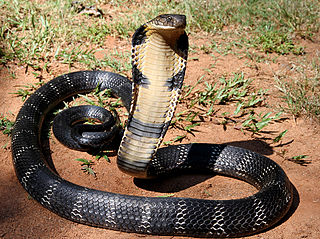
Elapidae is a family of snakes characterized by their permanently erect fangs at the front of the mouth. Most elapids are venomous, with the exception of the genus Emydocephalus. Many members of this family exhibit a threat display of rearing upwards while spreading out a neck flap. Elapids are endemic to tropical and subtropical regions around the world, with terrestrial forms in Asia, Australia, Africa, and the Americas and marine forms in the Pacific and Indian Oceans. Members of the family have a wide range of sizes, from the 18 cm (7.1 in) white-lipped snake to the 5.85 m king cobra. Most species have neurotoxic venom that is channeled by their hollow fangs, and some may contain other toxic components in various proportions. The family includes 55 genera with some 360 species and over 170 subspecies.
François Marie Daudin was a French zoologist.
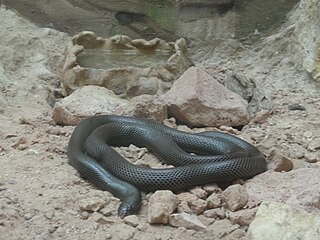
The Atractaspididae (atractaspidids) are a family of venomous snakes found in Africa and the Middle East, commonly called mole vipers, stiletto snakes, or burrowing asps. Currently, 12 genera are recognized.

Masticophis is a genus of colubrid snakes, commonly referred to as whip snakes or coachwhips, which are endemic to the Americas. They are characterized by having a long, thin body and are not dangerous to humans.
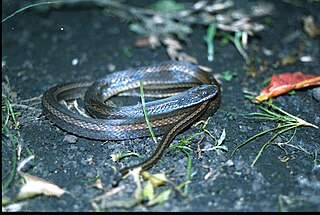
Coniophanes is a genus of colubrid snakes, commonly referred to as black-striped snakes, but they also have many other common names. The genus consists of 17 species, and despite the common name, not all of them display striping.

Dendrelaphis is a genus of colubrid snakes, distributed from Pakistan, India and southern China to Indonesia, Timor-Leste, the Philippines, Australia, New Guinea and the Solomon Islands. There are over forty described species. Asian species are known commonly as bronzebacks, while the Australo-Papuan species are simply called treesnakes. All are non-venomous and entirely harmless to humans.

Nature's Valley is a holiday resort and small village on the Garden Route along the southern Cape coast of South Africa. Nature's Valley lies between the Salt River, the foothills of the Tsitsikamma Mountains, the Indian Ocean and the Groot River lagoon. Nature's Valley has a balmy climate and is surrounded by the de Vasselot Nature Reserve which is part of the Tsitsikamma Park, and in turn part of the Garden Route National Park.

The narrow-striped mongoose or narrow-striped vontsira is a member of the family Eupleridae endemic to Madagascar. It inhabits the western Madagascar succulent woodlands and northern Madagascar spiny thickets in western and southwestern Madagascar, where it lives from sea level to about 125 m (410 ft) between the Tsiribihina and Mangoky rivers. In Malagasy it is called bokiboky. It is the only species in genus Mungotictis.
The striped harlequin snake is a species of snake in the family Atractaspididae. It is found in South Africa and Eswatini.
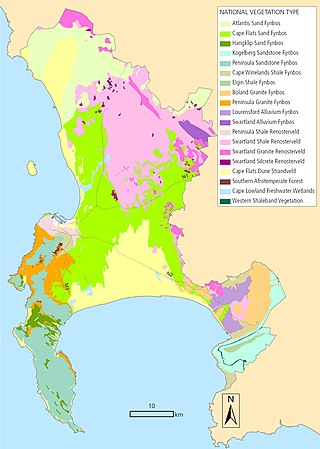
The Biodiversity of Cape Town is the variety and variability of life within the geographical extent of the City of Cape Town metropolitan municipality, excluding the Prince Edward Islands. The terrestrial vegetation is particularly diverse and much of it is endemic to the city and its vicinity. Terrestrial and freshwater animal life is heavily impacted by urban development and habitat degradation. Marine life of the waters immediately adjacent to the city along the Cape Peninsula and in False Bay is also diverse, and while also impacted by human activity, the habitats are relatively intact.

Psammophylax is a genus of snakes of the family Psammophiidae.

Philothamnus is a genus of snakes in the family Colubridae. The genus is endemic to Sub-Saharan Africa.

Pygopodoidea is a gecko superfamily and the only taxon in the gekkotan subclade Pygopodomorpha. The clade includes three Australasian families: Diplodactylidae, Carphodactylidae, and Pygopodidae. Traditional gekkotan systematics had considered Diplodactylidae and Carphodactylidae as subfamilies of the family Gekkonidae, but recent molecular work have placed Pygopodidae within Gekkonidae making it paraphyletic. These analyses have shown support of Pygopodidae and Carphodactylidae being sister taxa, with Diplodactylidae occupying a basal position in Pygopodoidea.
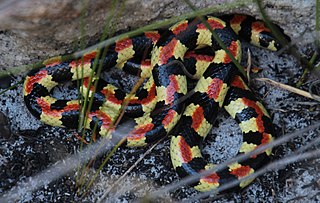
Homoroselaps lacteus, also known as the spotted harlequin snake, is a species of atracaspidid snake. It is found in South Africa and Eswatini.















